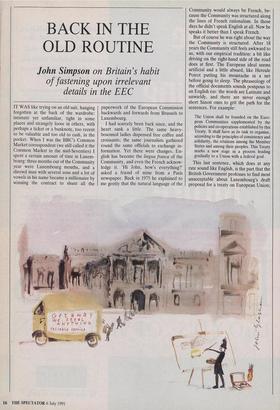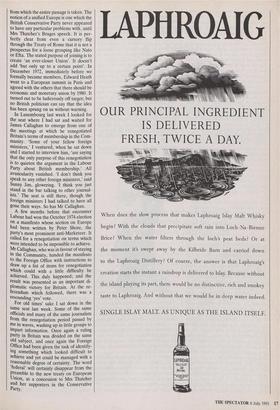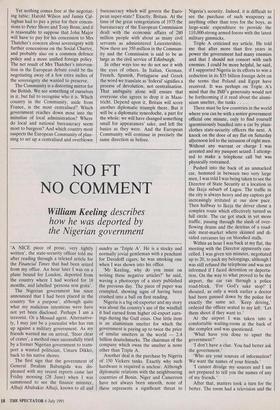BACK IN THE OLD ROUTINE
John Simpson on Britain's habit
of fastening upon irrelevant details in the EEC
IT WAS like trying on an old suit, hanging forgotten at the back of the wardrobe: intimate yet unfamiliar, tight in some places and strangely loose in others, with perhaps a ticket or a banknote, too recent to be valuable and too old to cash, in the pocket. When I was the BBC's Common Market correspondent (we still called it the Common Market in the mid-Seventies) I spent a certain amount of time in Luxem- bourg: three months out of the Community year were Luxembourg months, and a shrewd man with several sons and a lot of vowels in his name became a millionaire by winning the contract to shunt all the paperwork of the European Commission backwards and forwards from Brussels to Luxembourg.
I had scarcely been back since, and the heart sank a little. The same heavy- bosomed ladies dispensed free coffee and croissants; the same journalists gathered round the same officials to exchange in- formation. Yet there were changes. En- glish has become the lingua franca of the Community, and even the French acknow- ledge it. 'Hi John, how's everything?' asked a friend of mine from a Paris newspaper. Back in 1975 he explained to me gently that the natural language of the Community would always be French, be- cause the Community was structured along the lines of French rationalism. In those days he didn't speak English at all. Now he speaks it better than I speak French.
But of course he was right about the way the Community is structured. After 18 years the Community still feels awkward to us, with our empirical tradition: a bit like driving on the right-hand side of the road does at first. The European ideal seems artificial and a little absurd, like Hercule Poirot putting his moustache in a net before going to sleep. The phraseology of the official documents sounds pompous to an English ear: the words are Latinate and unwieldy, and there are never enough short Saxon ones to grit the path for the sentences. For example:
The Union shall be founded on the Euro- pean Communities supplemented by the policies and co-operations established by this Treaty. It shall have as its task to organise, according to the principles of consistency and ,solidarity, the relations among the Member States and among their peoples. This Treaty marks a new stage in a process leading gradually to a Union with a federal goal.
This last sentence, which does at any rate sound like English, is the part that the British Government professes to find most unacceptable about Luxembourg's draft proposal for a treaty on European Union; from which the entire passage is taken. The notion of a unified Europe is one which the British Conservative Party never appeared to have any particular problems with, until Mrs Thatcher's Bruges speech. It is per- fectly clear from even a cursory flip through the Treaty of Rome that it is not a prospectus for a loose grouping like Nato or Efta. The stated purpose of joining is to create 'an ever-closer Union'. It doesn't add 'but only up to a certain point'. In December 1972, immediately before we formally became members, Edward Heath went to a European summit in Paris and agreed with the others that there should be economic and monetary union by 1980. It turned out to be ludicrously off target; but no British politician can say that the idea has been sprung on us without warning.
In Luxembourg last week I looked for the seat where I had sat and waited for James Callaghan to emerge from one of the meetings at which he renegotiated Britain's terms of membership in the Com- munity. 'Some of your fellow foreign ministers,' I ventured, when he sat down and I started to interview him, 'are saying that the only purpose of this renegotiation is to quieten the argument in the Labour Party about British membership.' All avuncularity vanished. 'I don't think you speak to any other foreign ministers,' said Sunny Jim, glowering. 'I think you just stand in the bar talking to other journal- ists.' The seat is still there, though the foreign ministers I had talked to have all gone their ways. So has Mr Callaghan.
A few months before that encounter Labour had won the October 1974 election on a manifesto whose section on Europe had been written by Peter Shore, the party's most prominent anti-Marketeer. It called for a renegotiation on terms which were intended to be impossible to achieve. Mr Callaghan, who was in favour of staying in the Community, handed the manifesto to the Foreign Office with instructions to draw up a list of items for renegotiation which could with a little difficulty be achieved. This duly happened; and the result was presented as an important di- plomatic victory for Britain. At the re- ferendum which followed, there was a resounding 'yes' vote. For old times' sake I sat down in the same seat last week. Some of the same officials and many of the same journalists from the renegotiation period passed by me in waves, washing up in little groups to impart information. Once again a ruling party in Britain was divided on the same old subject, and once again the Foreign Office had been given the task of identify- ing something which looked difficult to achieve and yet could be managed with a reasonable degree of certainty. The word `federal' will certainly disappear from the preamble to the new treaty on European Union, as a concession to Mrs Thatcher and her supporters in the Conservative Party. Yet nothing comes free at the negotiat- ing table; Harold Wilson and James Cal- laghan had to pay a price for their conces- sions to Peter Shore and Tony Benn, and it is reasonable to suppose that John Major will have to pay for his concession to Mrs Thatcher's concern about sovereignty with further concessions on the Social Charter, and probably also on a common defence policy and a more unified foreign policy. The net result of Mrs Thatcher's interven- tion in the European debate could be the negotiating away of a few extra inches of the sovereignty she wanted to preserve.
The Community is a distorting mirror for the British. We see something of ourselves in it, but fail to recognise who it is. Which country in the Community, aside from France, is the most centralised? Which government reaches down most into the minutiae of local administration? Where do local and national bureaucracy seem most to burgeon? And which country most suspects the European Community of plan- ning to set up a centralised and overblown bureaucracy which will govern the Euro- pean super-state? Exactly. Britain. At the time of the great renegotiation of 1975 the bureaucracy of the European Commission dealt with the economic affairs of 280 million people with about as many civil servants as administered Leicestershire. Now there are 350 million in the Commun- ity and the Commission is said to be as large as the civil service of Edinburgh.
In other ways too we do not see it with the eyes of others. In Italian, German, French, Spanish, Portuguese and Greek the word we translate as 'federal' signifies a process of devolution, not centralisation. That ambiguity alone will ensure that everyone else agrees to drop it in Maas- tricht. Depend upon it, Britain will score another diplomatic triumph there. But it will be a diplomatic synecdoche, a part for the whole: we will have changed something small for appearances' sake, and left the basics as they were. And the European Community will continue in precisely the same direction as before.




















































 Previous page
Previous page